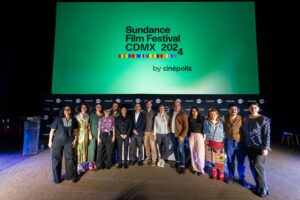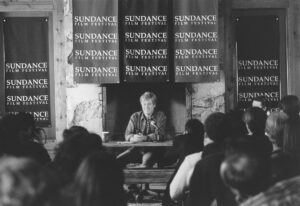WASHINGTON, D.C. — Sundance Institute and Americans for the Arts, the nation’s leading nonprofit organization for advancing the arts and arts education, today released a new report based on findings from the most recent National Arts Policy Roundtable.
Innovating for Impact: Arts-Based Solutions for a Stronger America is the result of a gathering of 35 leaders from the business, government, philanthropy, education and the arts sectors, which took place at the Sundance Resort in September 2011 to address ways in which the arts can be an economic driver as well as a vehicle for initiating positive social change.
The Roundtable participants made the following recommendations:
- Deepen Strategic Alliances Across Sectors: Expand cross-sector collaboration between the arts and other institutions to help solve social problems.
- Communicate the Value of the Arts: Engage individuals of all demographics in crafting and delivering personal narratives that demonstrate the importance of being an artist and the power expressing oneself gives them.
- Expand Lines of Inquiry and Future Research: Use both qualitative and quantitative data to demonstrate to the philanthropic, government and corporate sectors how the arts can be a key component in social problem-solving efforts.
- Integrate the Arts into Legislative and Other Policy Reforms: Leverage available funding streams to include the arts as part of economic development, neighborhood revitalization or other community-based initiatives.
Roundtable participants included Joyce Foundation President Ellen Alberding; actor and former Chair of the National Endowment for the Arts, Jane Alexander; filmmaker Angad Bhalla; Albert Chao, CEO Westlake Chemical; theatre artist Rha Goddess; musician Robert Gupta; filmmaker Lee Hirsch; playwright and former Sundance Institute board member Moises Kaufman; Americans for the Arts President and CEO, Robert L. Lynch; Anand Mahindra, CEO Mahindra & Mahindra, Ltd; Jeremy Nowak, President, William Penn Foundation; filmmaker Patrice O’Neill; Sundance Institute Executive Director Keri Putnam; Edgar L. Smith, CEO World Pac Paper; and noted actor, writer, producer and Sundance Institute board member Stanley Tucci.
“The arts are a fundamental component in the DNA of our communities and society at large,” said Robert L. Lynch, president and CEO of Americans for the Arts. “I look at every part of our society and see the arts affecting so much positive change for the economy, jobs, crime prevention, race relations, education, the health system and infrastructure. The recommendations communicate the value of the arts in American society and the integral role arts play in solving America’s social needs and issues.“
“The multifaceted power of the arts in communities, great and small, continues to grow and diversify,” said Sundance Institute president & founder Robert Redford. “From cultural diplomacy and fostering innovators of today and tomorrow, to massive economic impact, the arts are well past being considered a luxury we can do without. Public and private investment in the arts pays off in a big way and needs to expand and increase. Our own Sundance Film Festival’s overall economic impact, just since 2001, has been a half billion dollars, including thousands of jobs – a story repeating itself in cultural institutions all over the country.”
Participation in Roundtable Motivates Stanley Tucci to Testify Before Congress
Inspired by his participation in the 2011 Roundtable, Stanley Tucci testified before Congress on March 22 in Washington, D.C. Appearing before the House Appropriations Subcommittee on the Interior, Tucci’s testimony focused on the unique ability of the arts to unify people from diverse backgrounds by giving them common experiences. He also discussed how the arts can be used to help America’s citizens better understand and be proud of who they are as a people.
“We must not look at the arts as an adjunct to society, but a vital and integral part of society,” Tucci noted in his testimony. “Sometimes the arts make us think and see things as we have never before, sometimes they simply entertain and sometimes, if we are lucky, they do both.”
Roundtable Inspires Launch of The Bully Project: 1Million Kids Program in Cincinnati
The Roundtable gathering has already sparked action on both the national and local level. Lee Hirsch’s inspiring discussion of the making of critically acclaimed documentary “Bully” at the Roundtable prompted WorldPac Paper CEO Edgar L. Smith to bring the filmmaker and project to Cincinnati for a premiere as well as a series of in-depth dialogues with more than 12,000 young people in May 2012. The community-wide partnership has galvanized leaders from the Cincinnati school system, businesses (such as Procter & Gamble, Sunny Delight and the JLB-Cincinnati Reds), nonprofit organizations (such as The Strive Partnership, and Boy Scouts and Girl Scouts) and government to participate in the project.
“At the start of the National Arts Policy Roundtable, Robert Redford charged us, as leaders of a movement, to come up with ways to use arts-based solutions for a stronger America. And in Cincinnati, we feel we have done just that,” said Smith. “I am honored and proud to have been a significant contributor to facilitate Hirsch’s vision of making The Bully Project: 1Million Kids Program a reality.”
Recommendations Stimulate Arts-Based Social Problem-Solving Initiatives
Two initiatives linking arts and social problem-solving strategies are underway to create opportunities for direct dialogue between artists and business leaders around creativity and embed artists in social change and policy organizations.
The first, National Creativity Conversations,proposed by The Conference Board President and CEO Jonathan Spector, establishes a series of dialogues between artists and business leaders to be co-led by The Conference Board and Americans for the Arts. At these day-long gatherings business executives will gain an understanding of the skills artists practice such as creativity, innovation and the ability to influence others through dramatic articulation and the visualization of ideas. Because they will take place in both a business and an art setting the conversations can take on a more immediate flavor of each operation. The experience is designed to unlock potential collaborative models.
With support from the Time Warner Foundation, Ann Beeson, senior fellow, Open Society Foundations is initiating the National Culture and Change Fellowship Program, which is a concept for placing artists in social change positions in policy organizations, including businesses, foundations and local governments. Time Warner Executive and Roundtable participant Lisa Quiroz is participating along with Americans for the Arts Animating Democracy Co-Directors Barbara Schaffer Bacon and Pam Korza on the design team creating the initiative. Among the objectives for the project are to encourage more nonprofit, government and business leaders and organizations to routinely incorporate art and culture in their social change strategies.
About The National Arts Policy Roundtable
The National Arts Policy Roundtable was launched in October 2006 by Robert L. Lynch, president and CEO of Americans for the Arts, and Robert Redford, president and founder of Sundance Institute, on the premise that issues important to the arts are also important to society. Since its inception, the Roundtable has convened more than 175 top level decision makers and thought leaders from the fields of business, government, the social sector, education and the arts in a unique cross-sector forum designed to discuss issues and propose solutions critical to advancing American culture and vitality. Each Roundtable yields a series of recommendations on public policies and private sector practices that are necessary to move the issue from thought to action. Past topics addressed include the future of private sector funding for the arts, the role of the arts in building a creative and internationally-competitive and 21st century workforce, fostering civic engagement and in strengthening global communities. The National Arts Policy Roundtable is currently organized and hosted by Sundance Institute and Americans for the Arts. Event organization is led by Cara Mertes, Director, Documentary Film Program, Sundance Institute, and Nora Halpern, Vice President of Leadership Alliances, Americans for the Arts.
For a full copy of the report, please visit the National Arts Policy Roundtable page on Americans for the Arts’ website.
Americans for the Arts is the leading nonprofit organization for advancing the arts and arts education in America. With offices in Washington, D.C. and New York City, it has a record of more than 50 years of service. Americans for the Arts is dedicated to representing and serving local communities and creating opportunities for every American to participate in and appreciate all forms of the arts. Additional information is available at www.AmericansForTheArts.org.
Sundance Institute is a global nonprofit organization founded by Robert Redford in 1981. Through its artistic development programs for directors, screenwriters, producers, composers and playwrights, the Institute seeks to discover and support independent film and theatre artists from the United States and around the world, and to introduce audiences to their new work. The Institute promotes independent storytelling to inform, inspire, and unite diverse populations around the globe. Internationally recognized for its annual Sundance Film Festival, Sundance Institute has nurtured such projects as Born into Brothels, Trouble the Water, Son of Babylon, Amreeka, An Inconvenient Truth, Spring Awakening, I Am My Own Wife, Light in the Piazza and Angels in America. Join Sundance Institute on Facebook, Twitter and YouTube.
Contacts:
Catherine Brandt, 202-712-2054, cbrandt@artsusa.org
Sarah Eaton, 310-492-2320, sarah_eaton@sundance.org




